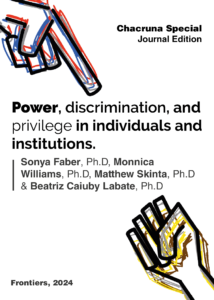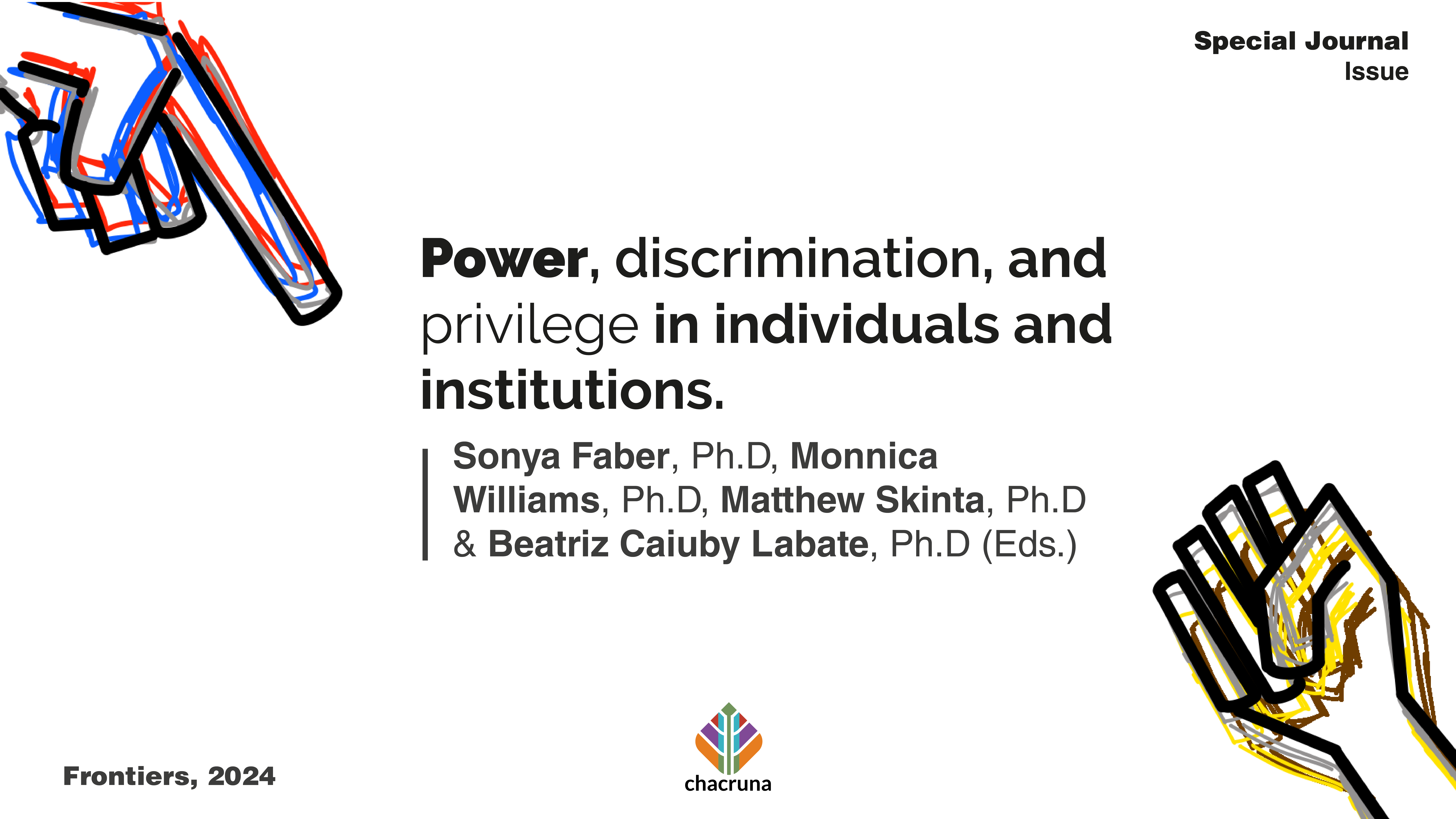- Psychedelics and Attachment: Fundamentals, Implications, and New Frontiers - May 16, 2025
- Development Outreach Internship (OPEN) - May 6, 2025
- Social Media and Content Production Internship (OPEN) - May 6, 2025
Frontiers in Psychology, 2024
Guest Editors: Sonya Faber (University of Ottawa); Monnica T. Williams (University of Ottawa); Matthew D. Skinta (Roosevelt University); Bia Labate (Chacruna Institute)

Dr. Sonya Faber graduated with a Masters in Neurobiology from Brown University after completing her undergraduate work at the University of Pennsylvania. She continued her graduate studies at New York University earning a PhD in molecular genetics with a thesis concentration in signal transduction. Over the course of the last 15 years, she has had the opportunity and privilege to contribute equally to both academic research institutes and commercial pharmaceutical development. She has worked in clinical operations for companies including, IQVIA, Covance and Sanofi-Aventis. Her interests lie in creating innovative solutions for projects which could benefit both patients and the scientific community, in part by connecting with top scientists, industry and regulatory agencies.In her academic roles, she assessed novel ideas and supported scientists in making these commercially viable while contributing to several original grants and research papers and patents. Her interest in protocol design, medical writing and project management, which she utilized in both pharma and biotech firms, included pre-clinical and clinical activities for phase II and III trials across multiple indications. She has a special interest in training the next generation of clinical researchers and has designed courses to teach scientific writing and Good Clinical Practice. Dr. Faber is member of the Board Directors of the Chacruna Institute for Psychedelic Plant Medicines and serves on Chacruna’s Racial Equity and Access Committee. In the past two years, she has started an international collaboration with researchers at the University of Ottawa in Canada on several projects in the area of mental health disparities and social justice. She also served on the steering committee for the American Psychedelic Practitioners Association.

Monnica T. Williams is a board-certified licensed clinical psychologist and Professor in the School of Psychology, where she is the Canada Research Chair in Mental Health Disparities. Prior to her move to Canada, Dr. Williams was on the faculty of the University of Pennsylvania Medical School (2007-2011), the University of Louisville in Psychological and Brain Sciences (2011-2016), where she served as the Director of the Center for Mental Health Disparities, and the University of Connecticut (2016-2019) where she had appointments in both Psychological Science and Psychiatry. Dr. Williams’ research focuses on BIPOC mental health, culture, and psychopathology, and she has published over 100 scientific articles on these topics. She also gives diversity trainings nationally for clinical psychology programs, scientific conferences, and community organizations. She is Chair of their Accreditation and Educational Standards Committee. She serves as an associate editor of Behavior Therapy. She also serves on the editorial board of Cognitive Behaviour Therapy, Canadian Psychology, International Journal of Mental Health, Journal of Psychedelic Studies, and the Journal of Obsessive Compulsive and Related Disorders. Her work has been featured in several major media outlets, including NPR, CTV, Huffington Post, and the New York Times.

Matthew D. Skinta, Ph.D., ABPP, is a board-certified clinical health psychologist and assistant professor at Roosevelt University. Dr. Skinta co-edited Mindfulness and Acceptance for Gender and Sexual Minorities: Contextual Strategies to Foster Self-Compassion, Connection, and Equality (2016), and recently authored Using Contextual Behavior Therapy with Sexual and Gender Minority Clients: A Practical Guide to Treatment (2020). He has trained therapists working with MDMA and psilocybin in the use of both Acceptance & Commitment Therapy and Functional Analytic Psychotherapy.

Bia Labate (Beatriz Caiuby Labate) is an anthropologist, educator, author, speaker, and activist, committed to the protection of sacred plants while amplifying the voices of marginalized communities in the psychedelic science field. As a queer Brazilian anthropologist based in San Francisco, she has been profoundly influenced by her experiences with ayahuasca since 1996. Dr. Labate has a Ph.D. in social anthropology from the University of Campinas (UNICAMP) in Brazil. Her work focuses on plant medicines, drug policy, shamanism, ritual, religion, and social justice. She is the Executive Director of the Chacruna Institute for Psychedelic Plant Medicines and serves as a Public Education and Culture Specialist at the Multidisciplinary Association for Psychedelic Studies (MAPS). Additionally, she is a Visiting Scholar at the Graduate Theological Union in Berkeley and an advisor for the Veteran Mental Health Leadership Coalition. Dr. Labate is also a co-founder of the Interdisciplinary Group for Psychoactive Studies (NEIP) in Brazil and the editor of its site. She has authored, co-authored, and co-edited 28 books, three special-edition journals, and numerous peer-reviewed and online publications (http://www.bialabate.net).
Abstract

We are very pleased to introduce this Research Topic in Frontiers on the topic of “Power, discrimination, and privilege in individuals and institutions”. People and systems they create are rife with prejudices, leading to discrimination and inequitable outcomes. Problems operating in oppressive systems include racism, casteism, colorism, sexism, heterocentrism, ethnocentrism, and their intersections. These biases cause issues such as rejection of stigmatized groups, structural racism, disenfranchisement of women, barriers to higher education, economic oppression, radicalization, and colonialism. In this Research Topic, we take a closer look to find the core of the problem, which is inevitably an imbalance in the distribution of power and its misuse.
This Research Topic contains 20 articles that cover a range of critical issues in Psychology (Personality and Social, Forensic and Legal, Cultural, and Gender, Sex and Sexualities) and Sociology (Race and Ethnicity, and Gender, Sex and Sexualities). These articles originate with researchers from countries including Germany, China, Singapore, Romania, the USA, and Canada. The researchers submitting these articles identify with a range of ethnicities, including Roma, Indigenous Australian, African American, Mexican American, Southeast Asian, Jewish Canadian, and Black German to name a few.
Table of Contents
Editorial: Power, discrimination, and privilege in individuals and institutions
Sonya C. Faber, Monnica T. Williams, & Matthew D. Skinta
Power decline and the change of self-esteem: The moderating effect of self-defense
Caiyun Huang
Power is a fundamental force in social relationships. Having more power means more freedom and resources and the ability to control and influence others. Psychologically, people are afraid of power decline, therefore are motivated towards self-enhancement to avoid the decline of self-esteem. We asked if power decline brings about a subsequent decline in self-esteem.
Compassion as a tool for allyship and anti-racism
Melissa M. Karnaze, Ramya M. Rajagopalan, Lisa T. Eyler, & Cinnamon S. Bloss
Racist systems, policies, and institutions subvert the quality of life for minoritized individuals and groups, across all indicators, from education and employment, to health, to community safety. Reforms to address systemic racism may be accelerated with greater support from allies who identify with the dominant groups that derive advantage from such systems. Although enhancing empathy and compassion for impacted individuals and groups may foster greater allyship with and support of minoritized communities, little work to date has assessed the relationships among compassion, empathy, and allyship. After reviewing current work in the area, this perspective offers insights into the utility and specific components of a compassion-based framework that can be used to combat racism, using findings from a survey study in which we investigated the relationship between validated psychometric measures of compassion and allyship with minoritized communities. Several subdomains of compassion, as measured among individuals identifying as non-Black, correlate significantly with levels of felt allyship with Black or African American communities. These findings inform recommendations for compassion-focused research, including development and testing of interventions to promote allyship, advocacy, and solidarity with minoritized groups, and support efforts to undo longstanding structural racisms that have patterned inequality in the United States.\
Racism and censorship in the editorial and peer review process
Dana Strauss, Sophia Gran-Ruaz, Muna Osman, Monnica T. Williams, & Sonya C. Faber
Psychology aims to capture the diversity of our human experience, yet racial inequity ensures only specific experiences are studied, peer-reviewed, and eventually published. Despite recent publications on racial bias in research topics, study samples, academic teams, and publication trends, bias in the peer review process remains largely unexamined. Drawing on compelling case study examples from APA and other leading international journals, this article proposes key mechanisms underlying racial bias and censorship in the editorial and peer review process, including bias in reviewer selection, devaluing racialized expertise, censorship of critical perspectives, minimal consideration of harm to racialized people, and the publication of unscientific and racist studies. The field of psychology needs more diverse researchers, perspectives, and topics to reach its full potential and meet the mental health needs of communities of colour. Several recommendations are called for to ensure the APA can centre racial equity throughout the editorial and review process.
Radicalization from a societal perspective
Delaram Shafieioun & Hina Haq
Studies on radicalization tend to focus on the dynamics of extremist groups and how they exploit grievances of vulnerable individuals. It is imperative, however, to also understand the societal factors that lead to such vulnerabilities and grievances. Our social environment plays a key role in how we view the world and shape our beliefs. By understanding the social dynamics, we can gain insight into the motivations that drive people to extremism. Throughout this paper, we examine the societal factors and processes such as discriminative institutional structures and social norms/practices that can make an individual vulnerable and serve as a driving force for them to join a radical group. To do that, we use the process-oriented psychology of Arnold Mindell and the phenomenology of whiteness of Sara Ahmed as our theoretical framework. These frameworks help us map out the societal dynamics causing individuals to carve social niches out of their current social group and into an extremist group. We use interviews with ex-militants of the radical group, Islamic State of Iraq and Syria, to show how certain societal dynamics, such as social injustice, misuse of power, marginalization and discrimination, served as key factors that led these individuals to identify and sympathize with radical ideology. The aim of this paper is to emphasize that, to develop effective preventative measures against recruitment into extremist groups, it is imperative to have a profound understanding of the social dynamics that make an individual susceptible to radicalization in the first place.
Emotional relevance and prejudice: testing the differentiated effect of incidental disgust on prejudice towards ethnic minorities
Emila Pascal, Andrei Corneliu Holman, & Felicia Mihael Miluț
Negative emotions such as disgust or anger influence the evaluation of minorities and amplify prejudice, stereotypes, and discrimination behaviors towards them. However, new discoveries suggest that these spillover effects might be more specific in the sense that the bias might occur only if the emotions are specific to the affect that is generally evoked by that particular minority, i.e. anger increases prejudice towards anger-relevant groups, and disgust towards disgust-relevant groups. Our study aimed to examine, the specificity of the spillover effects, namely the importance of emotion’s relevance to the prejudice towards out-groups. To test this hypothesis, we investigated the influence of incidental disgust on the evaluation of two minorities, one that is usually associated with disgust (the Roma minority) and one usually associated with anger (the Hungarian minority). We used a 2 × 2 between-subjects experimental design where we manipulated the emotion experienced by the participants (disgust versus neutral) and the target they evaluated (Romani or Hungarian minority). We tested the effects of these manipulations on three aspects of prejudice toward the target group: cognitive, affective, and behavioral. The results support the specificity of the spillover effect, by showing that incidental disgust increased prejudice only towards the disgust-relevant target, namely the Roma minority, and that the intensity of this emotion experienced by the participants mediates this effect. Moreover, incidental disgust increased not only the negative emotions associated with the Romani (i.e., the affective component) but also the negative cognitions associated with them and the desire to maintain an increased social distance (i.e., behavioral prejudice). These findings highlight the importance of emotions’ relevance in bias toward minorities and provide a starting point for future anti-discrimination interventions.
Critical action to redress systemic oppression: a person-centered approach
Kristin Vierra, Aldo Barrita, Gloria Wong-Padoongpatt, & Rachael D. Robnett
In 2020, public outcry against police brutality prompted many social media users to post black squares and use the hashtag #BlackLivesMatter (BLM). Many of the people who posted these squares were engaging in performative action in the sense that they failed to engage with BLM’s history and core principles. Drawing from a critical action framework, the current research seeks to more deeply understand what drives people to engage in more versus less impactful forms of action to resist systemic oppression.
Ethnic identity and resilience: a moderated mediation analysis of protective factors for self-blame and racial microaggressionshttps://www.frontiersin.org/journals/psychology/articles/10.3389/fpsyg.2023.1198375/full
Aldo M. Barrita & Gloria Wong-Padoongpatt
People of Color (PoC) in the United States encounter everyday racial microaggressions, and these commonplace experiences can wear and exhaust PoC’s resources. Racial microaggressions have shown detrimental effects on physical and psychological well-being. Consequently, researchers have examined and tested different ways in which PoC cope and protect themselves from these everyday exchanges. Past findings have indicated that PoC might blame themselves for racism-related occurrences to cope with these commonplace discriminatory experiences. Ethnic identity and resilience have emerged in research as protective factors that can moderate and buffer the impact of racism on PoC’s well-being. We used a combination of mediation, moderation, and conditional analyses to unpack the relationships between racial microaggression (predictor), psychological distress (outcome), self-blame (mediator), resilience (moderator), and ethnic identity (moderator).
Pathways to the therapist paragon: a decolonial grounded theory
Jude Bergkamp, Maeve O’Leary Sloan, Jack Krizizke, Malea Lash, Noah Trantel, Jason Vaught, Tessa Fulmer, Ilana Waite, Abigail M. Martin, Cynthia Scheiderer, & Lindsay Olson
While many professional associations within clinical and counseling psychology have made an aspirational call for clinician awareness of social position, there is a lack of research into how socially-conferred privilege impacts psychotherapy. Specifically of interest is the differences in race and gender within the therapeutic dyad, in which there is a BIPOC (Black, Indigenous, and Persons of Color)/white or male/female-identified dynamic.
Cancel culture can be collectively validating for groups experiencing harm
Marissa Traversa, Ying Tian, & Stephen C. Wright
Social psychological research on collective action and intergroup harm has yet to adequately consider the potential role of cancel culture or feelings of collective validation in motivating collective action. The current research will begin to fill this gap and may broaden our understanding of the psychological mechanisms that inspire and maintain collective action in response to intergroup harm. To our knowledge, this research is the first social psychological analysis of the impact of cancel culture on collective action and as means for producing feelings of collective validation.
Promoting appetitive learning of consensual, empowered vulnerability: a contextual behavioral conceptualization of intimacy
Louisiana Contextual Science Research Group
Vulnerability is emphasized in a number of theoretical models of intimacy (e.g., Intimacy Process Model), including from behavioral and contextual behavioral perspectives. Vulnerability is generally defined as susceptibility to harm and involves behaviors that have been historically met with aversive social consequences. From these perspectives, intimacy is fostered when vulnerable behavior is met with reinforcement. For example, interventions have trained intimacy by building skills in emotional expression and responsiveness with promising results. Vulnerability has divergent functions, however, depending on the interpersonal context in which it occurs. Functional intimacy is explored through the lens of functional relations, which play a key role in interpersonal processes of power, privilege, and consent. This conceptualization suggests that vulnerability must be under appetitive functional relations, consensual, and empowered for safe intimacy to emerge. The responsibility to promote appetitive learning of consensual, empowered vulnerability to foster intimacy falls to the person with more power in a particular interaction and relationship. Recommendations are offered for guiding this process.
The intersection of race and femininity in the classroom
Naomi S. Faber & Monnica T. Williams
This vignette told in eight graphic panels illustrates a story about how emotional responses associated with White femininity are used to derail a classroom discussion about racial injustice in a university setting. The panels show how this weaponization of femininity occurs and how it shields those who wield it from external criticism while centering themselves in conversations about race. Women of other races typically cannot access this psychological tactic, thus it constitutes a strategic intersectional use of race, psychology, and privilege to access a power position. In offering suggestions on how to respectfully engage in situations in which racial injustice is a topic of discussion, we unveil how failure of emotional regulation is part of the core psychological framework that leads to these kinds of power dynamics.
Abuse of power in the disciplinary actions of a state psychology licensing board: inequitable outcomes and early career psychologists
Sonya C. Faber, Edward Wu, & Amy Bartlett
The field of psychology has established high professional standards which have become a cornerstone of the practice of psychology. However, powerful boards tasked with administering these standards can operate with little oversight, making it difficult to monitor whether these institutions are operating in a fair and impartial way. In particular, early-career psychologists who have less experience and power in their initial years of independent practice may be singularly vulnerable as they have relatively little experience to navigate the profession, including fielding complaints that may be made against them to a licensing board. While it is essential to ensure early-career psychologists are upholding their commitments to the practice, there are risks in policing their activities without orienting toward growth, learning, and professional development. Even the smallest disciplinary action may never be expunged from a psychologist’s record, resulting in long-term implications for insurance coverage, reputation and future professional viability in the field. Overly-punitive approaches can be distressing or even traumatizing. In this paper, we examine disciplinary actions of the Kentucky Board of Examiners of Psychology (KBEP) from the years 2000 to 2020 (N = 65) to determine the methodology by which the Board administers its oversight function. We analyze the nature of the discipline received (fines, suspensions, continuing education, supervision) revealing a two-tiered system of punishments, and provide context regarding the nature of the disciplinary process and its impacts. We report on qualitative interviews of early career psychologists subject to disciplinary actions by the Board, and psychologists who supervised early career psychologists investigated by the Board. We compare legislation governing KBEP and make comparisons to the workings of licensing boards in three other states. Using these findings, we make recommendations for revisions to the applicable legislation and administrative processes of the Board to establish an improved balance between public safety, the well-being of new psychologists, equity considerations such as race, and the development of the practice of psychology in Kentucky. This work brings to light previously unexamined injustices that can knowingly or unknowingly be perpetuated by licensing Boards, and can be used to inform the creation of more just, balanced and inclusive professional Boards.
Postdoctoral researchers’ perspectives on working conditions and equal opportunities in German academia
Jacob D. Davidson, Felipe Nathan de Oliveira Lopes, Sajjad Safaei, Friederike Hillemann, Nicholas J. Russell, & H. Lina Schaare
Postdoctoral researchers (postdocs) are an essential component of the scientific workforce in German universities and research institutions and play a vital role in advancing knowledge and innovation. However, the experiences of postdocs and other early career researchers (ECRs) indicate that working conditions pose a significant challenge to the pursuit of a long-term research career in Germany—particularly for international scientists and those from marginalized groups. We examine how unstable working conditions as well as insufficient structural support for equal opportunities and diversity are significant obstacles for the career development of ECRs in German academia. We discuss these issues with the aid of an extensive survey recently conducted and published by PostdocNet, a target-group network representing the interests of postdocs across Germany’s Max Planck Society. The survey drew responses from 659 postdoctoral researchers working at the Max Planck Society and represents one of the few datasets of postdoctoral researchers’ perspectives in Germany. Building on these findings, we suggest actions at governmental, institutional, and individual levels to improve the working conditions of postdoctoral researchers in Germany.
Actual and symbolic prisons, Black men, and the freedom-unfreedom paradox: interrogating the bad faith of racialized oppression in a post-accountable United States
Darron T. Smith & Brenda G. Harris
Drawing on systemic racism theory, white racial framing and the notion of bad faith as the connecting, justifying thread between ideals of freedom and equality and actions realizing unfreedom and inequities, this essay explores the alchemy of race, masculinity, and racialized oppression and its consequences for Black men past and present in United States society. This essay’s aim is to trace the historical ideologies and cultural practices, relations, and normative standards that have contributed to, and hence must be challenged to confront, the inequitable, race-based relations of power, and privilege at the root of institutionalized injustices. To do so, this essay interrogates the dissonance of bad faith as a corrective mode of truth telling to highlight and tap the equity potential of Black men’s collective, historical rejections of the White mainstream’s conflicting definitions and deceptive reasonings requisite for pushing toward racial justice, healing, and peace.
Development of the oppression-based traumatic stress inventory: a novel and intersectional approach to measuring traumatic stress
Samantha C. Holmes, Daniel Zalewa, Chad T. Wetterneck, Angela M. Haeny, & Monnica T. Williams
There is a growing body of literature demonstrating that experiences of oppression (e.g., racism, sexism, heterosexism, poverty) are associated with posttraumatic stress disorder symptoms. Traditional trauma assessments do not assess experiences of oppression and it is therefore imperative to develop instruments that do. To assess oppression-based traumatic stress broadly, and in an intersectional manner, we have developed the oppression-based traumatic stress inventory (OBTSI). The OBTSI includes two parts. Part A comprises open-ended questions asking participants to describe experiences of oppression as well as a set of questions to determine whether Criterion A for PTSD is met. Part B assesses specific posttraumatic stress symptoms anchored to the previously described experiences of oppression and also asks participants to identify the various types of discrimination they have experienced (e.g., based on racial group, sex/gender, sexual orientation, etc.). Clients from a mental health clinic and an undergraduate sample responded to the OBTSI and other self-report measures of depression, anxiety, and traditional posttraumatic stress (N = 90). Preliminary analyses demonstrate strong internal consistency reliability for the overall symptom inventory (α = 0.97) as well as for the four symptom clusters of posttraumatic stress symptoms in the DSM-5 (α ranging from 0.86 to 0.94). In addition to providing descriptive information, we also assess the convergent validity between the OBTSI and measures of anxiety, depression, and traditional posttraumatic stress and examine the factor structure. This study provides preliminary evidence that the OBTSI is a reliable and valid method of assessing oppression-based traumatic stress symptoms.
The illusion of inclusion: contextual behavioral science and the Black community
Sonya C. Faber, Isha W. Metzger, Joseph La Torre, Carsten Fisher, and Monnica T. Williams
Anti-racism approaches require an honest examination of cause, impact, and committed action to change, despite discomfort and without experiential avoidance. While contextual behavioral science (CBS) and third wave cognitive-behavioral modalities demonstrate efficacy among samples composed of primarily White individuals, data regarding their efficacy with people of color, and Black Americans in particular, is lacking. It is important to consider the possible effects of racial stress and trauma on Black clients, and to tailor approaches and techniques grounded in CBS accordingly. We describe how CBS has not done enough to address the needs of Black American communities, using Acceptance and Commitment Therapy (ACT) and Functional Analytic Psychotherapy (FAP) as examples. We also provide examples at the level of research representation, organizational practices, and personal experiences to illuminate covert racist policy tools that maintain inequities. Towards eradicating existing racism in the field, we conclude with suggestions for researchers and leadership in professional psychological organizations.
Effects of salient factors on the pursuit of higher education among multicultural youth in Hong Kong
Celeste Y.M. Yuen, Alan C.K. Cheung, & K.H. Leung
This study presents novel and compelling evidence of the disparities in factors influencing the beliefs and aspirations for higher education among mainstream and immigrant youth in Hong Kong, particularly those who are underprivileged. We developed and validated a psychometric questionnaire, known as the Post-Secondary Education Pursuit Instrument (PSEPi), which was administered to 4,850 students aged between 15 and 18 years old from 23 secondary schools. The objective of this study was to explore the factors that impact students’ choices and plans for higher education. The results of the one-way Multivariate Analysis of Variance (MANOVA) analysis deepen our understanding of the differential effects of success and obstacle factors on students’ higher education pursuits across various cultural groups. The underprivileged mainstream, Chinese immigrant, and ethnic minority South Asian youth reported a perceived glass ceiling effect associated with their ethnic backgrounds, as well as financial aid barriers, while pursuing higher education, in contrast to their average Hong Kong mainstream counterparts (mean Cohen’s d = 0.40). The direct effects and multiple mediation analyses demonstrated that significant others’ influence, particularly the influence of parents, and locus of control are prime determinants of the perceived usefulness of higher education for all student groups. The implications are that educational policies should be implemented to level the playing field in higher education admissions for both privileged and underprivileged youth in Hong Kong and other international countries. Overall, this study provides robust empirical evidence that can be utilized to enhance educational policies and practices to bridge the gap between mainstream and underprivileged immigrant youth in their pursuit of higher education.
An introduction to the basic elements of the caste system of India
Vina M. Goghari & Mavis Kusi
Oppression, systemic bias, and racism have unfortunately long been part of the human experience. This paper is a review of basic elements of the Indian caste system, understanding its impact on the daily lives of different caste members, the role of colonialism in perpetuating the caste system, the Indian reservation system for mitigating disadvantages created by the caste system, and how categorization and labels can affect individual identity. This paper then discusses the global relevance of the caste system and its impact on mental health and psychological functioning. In India, the caste system is a comprehensive, systematized, and institutionalized form of oppression of members of the lower castes, particularly the Dalits. Formalized during the British colonial period, the caste system brings together two related Indian concepts of varna and jāti to create four social orders and multiple subunits. Sitting outside the traditional four orders are the Dalits, who experience social, economic, and religious discrimination due to an inherited status related to traditionally polluting occupations. Since the caste system extends beyond India to other South Asian countries, as well as to communities around the world that are home to the Indian diaspora, the inequities created by the caste system are a global issue. India’s affirmative action system provides important insights to policy makers, as well as researchers in the social sciences for how to counteract the effects of systematized oppression. Collectively, this can aid in a better understanding of the effects of discrimination and oppression on identity, self-esteem, and mental health, and how we can develop more targeted policies and procedures in our own local contexts.
Conducting research with Indigenous Peoples in Canada: ethical and policy considerations
Dominique Morisano, Margaret Robinson, Brian Rush, & Renee Linklater
The international context of Indigenous mental health and wellbeing has been shaped by a number of key works recognizing Indigenous rights. Despite international recognitions, the mental health and wellness of Indigenous Peoples continues to be negatively affected by policies that ignore Indigenous rights, that frame colonization as historical rather than ongoing, or that minimize the impact of assimilation. Research institutions have a responsibility to conduct ethical research; yet institutional guidelines, principles, and policies often serve Indigenous Peoples poorly by enveloping them into Western knowledge production. To counter epistemological domination, Indigenous Peoples assert their research sovereignty, which for the purposes of this paper we define as autonomous control over research conducted on Indigenous territory or involving Indigenous Peoples. Indigenous sovereignty might also be applied to research impacting the landscape and the web of animal and spiritual lives evoked in a phrase such as “all my relations.” This narrative review of material developed in the Canadian context examines the alignment with similar work in the international context to offer suggestions and a practice-based implementation tool to support Indigenous sovereignty in research related to wellness, mental health, and substance use. The compilation of key guidelines and principles in this article is only a start; addressing deeper issues requires a research paradigm shift.
Legal violence: the struggles of Thai women in Thai massage businesses
Krittiya Kantachote
Prior studies of legal violence concerning minority groups in the United States are often linked to Immigration Law. Drawing primarily from 30 interviews with Thai massage business owners in Los Angeles, this article reveals how the implementation of local and federal regulations and laws regarding massage businesses constitutes legal violence. Using Crenshaw’s structural, political, and representational intersectionality, this article demonstrates how Thai women’s race, ethnicity, and gender affect their experiences in countering the state regulations. The analysis focuses on two interrelated areas of Thai massage business owners’ and Thai massage therapists’ lives—the strict government surveillance of Thai massage business operations and the enforcement of professional certification. This legal violence toward Thai massage owners and massage therapists is rooted in a legal system that aims to protect consumers. Nevertheless, the effect of legal violence is not limited to undocumented Thai immigrants but also affects Thai American citizens and legal permanent residents.
Explore the our Power and Discrimination series based on this series here. Learn how to submit an article to this Chacruna Chronicles series here.
Graphics by Mulinga.
Take a minute to browse our stock:
Did you enjoy reading this article?
Please support Chacruna's work by donating to us. We are an independent organization and we offer free education and advocacy for psychedelic plant medicines. We are a team of dedicated volunteers!
Can you help Chacruna advance cultural understanding around these substances?














